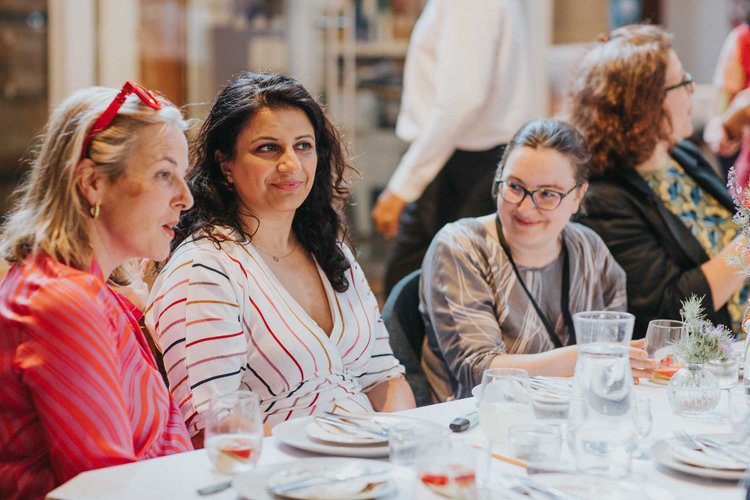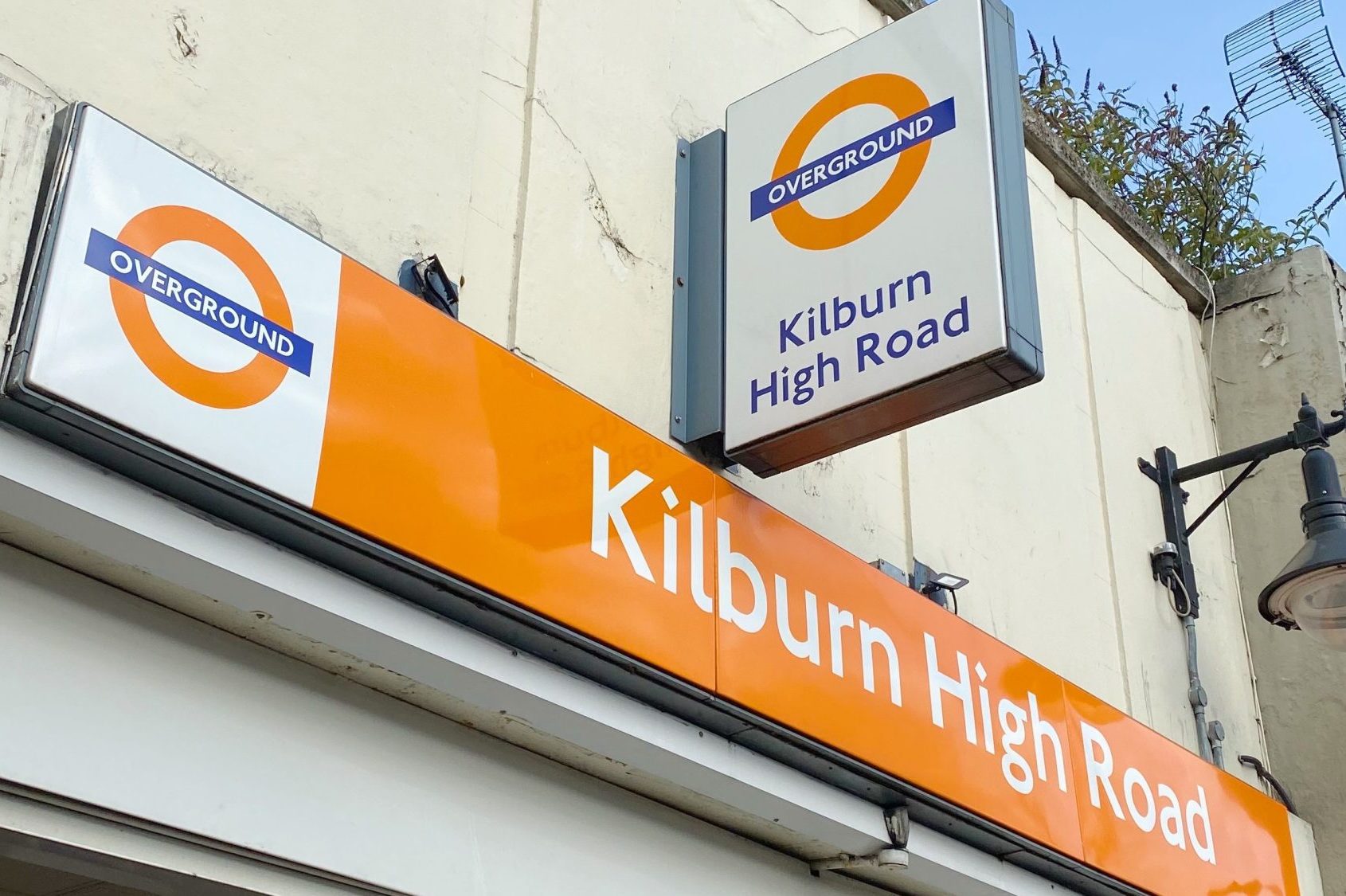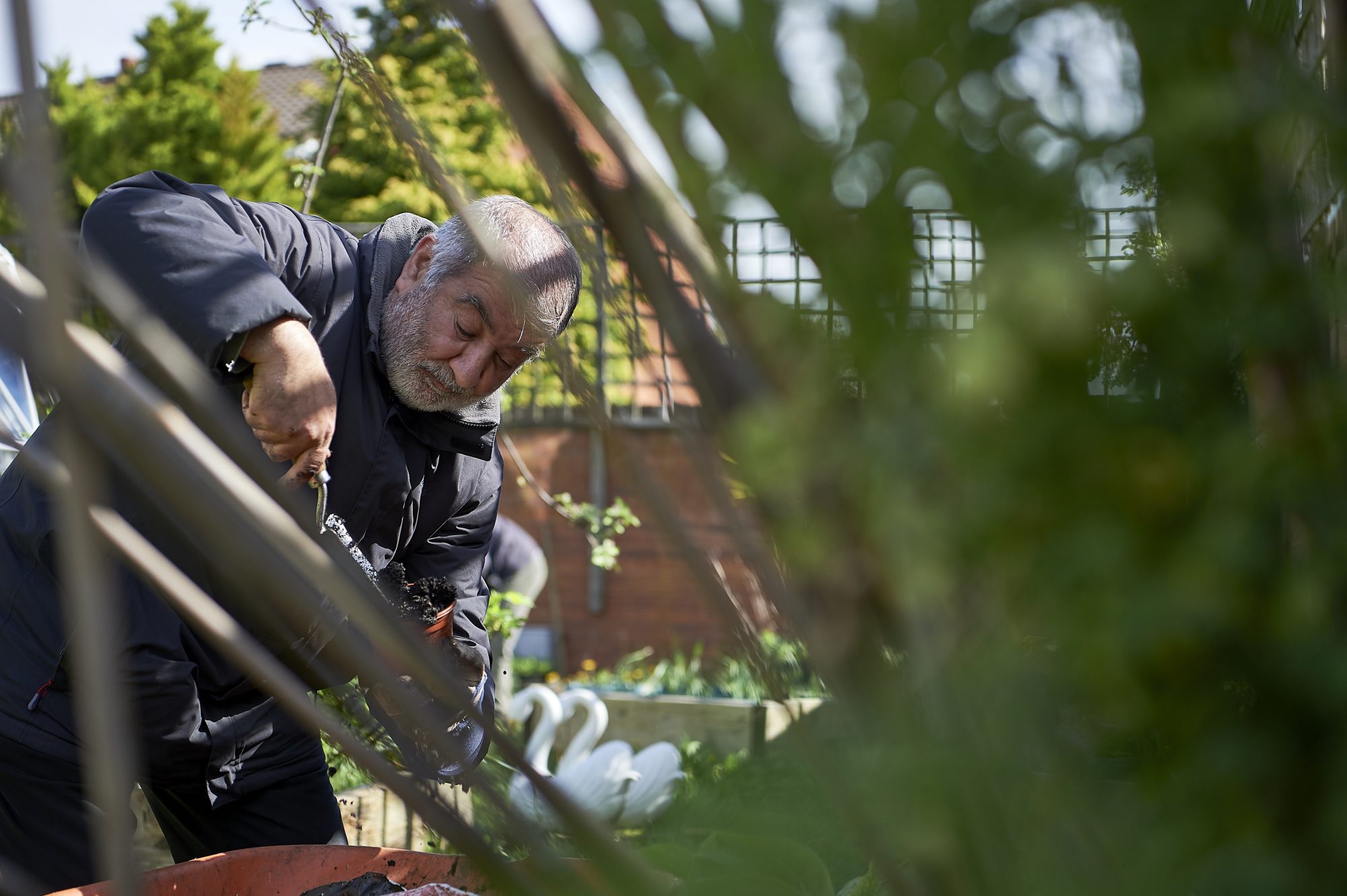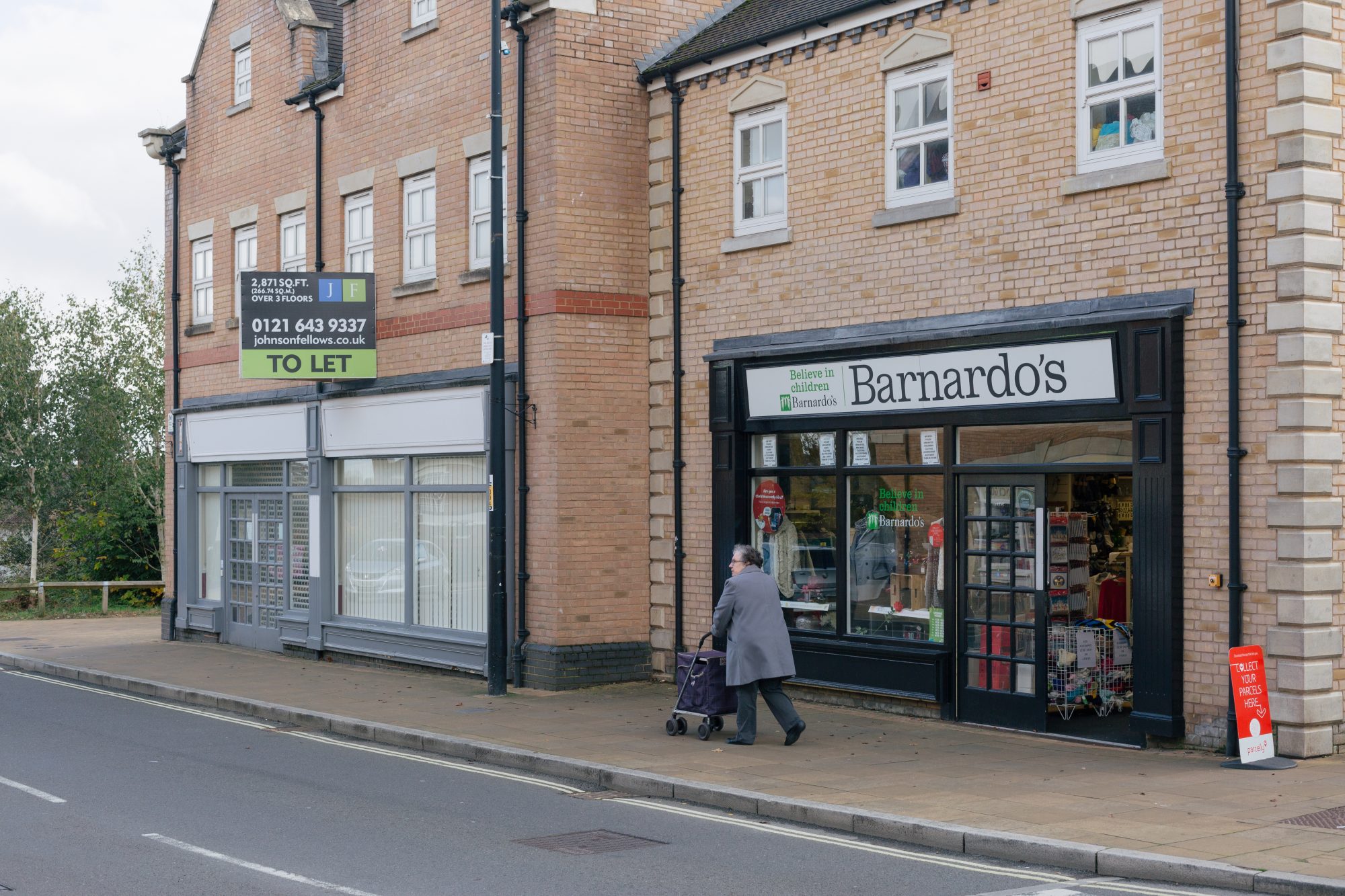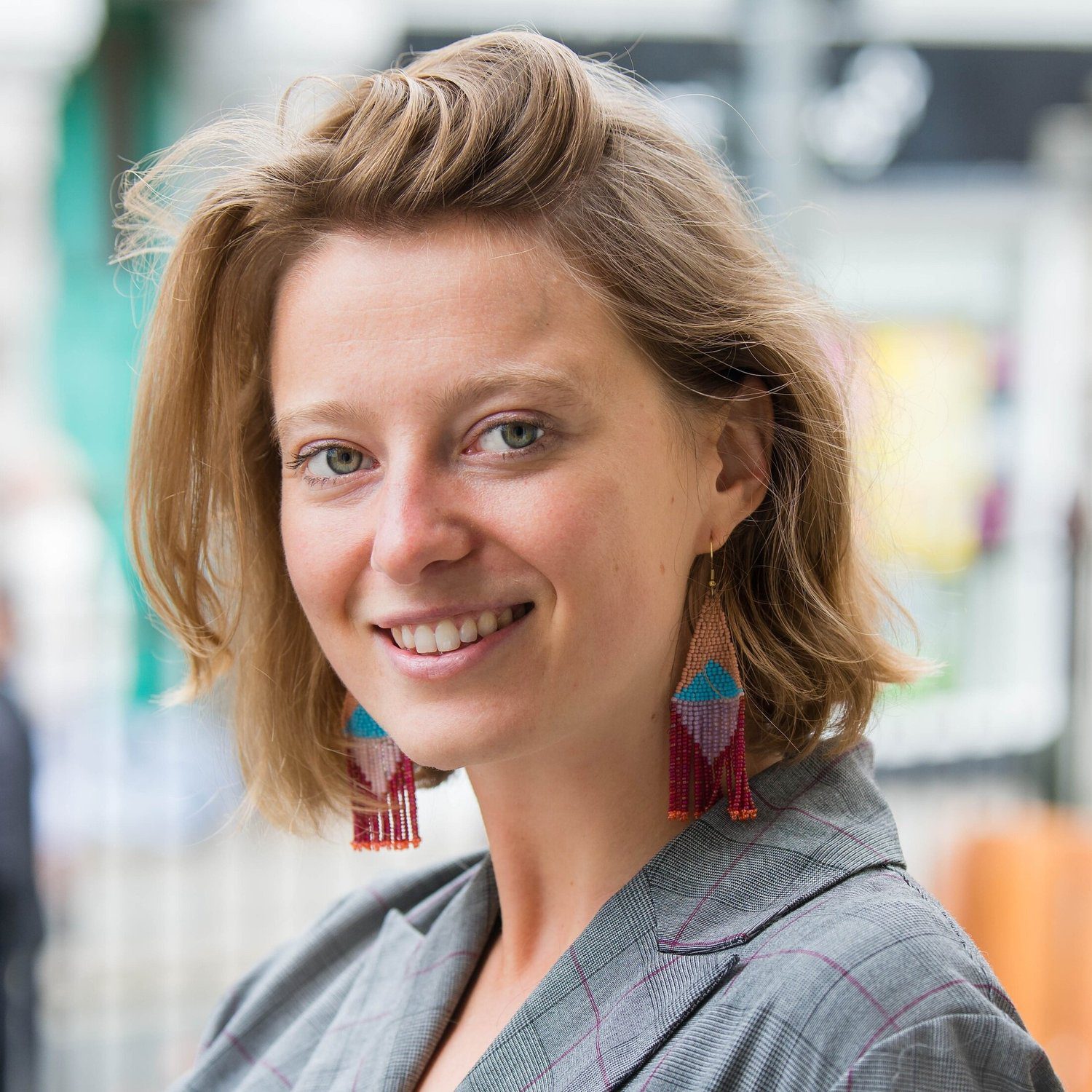
Bex Trevalyan
Co-founder, Platform Places and Library of Things
It started with a question, over Zoom, in the thick of lockdown: Who are we not talking to?
That was Vidhya Alakeson, OBE — then-CEO of Power to Change. I’d been speaking with her about the systemic problem impacting our neighbourhoods: incredible community leaders unable to access empty high street spaces, despite having amazing visions for socially-just, climate-safe neighbourhoods. Councils with a mandate to transform town centres, but limited powers to find and convene building owners. And property owners with empty units previously occupied by Topshop or Debenhams, quietly saying, “This isn’t working for us either.”
At the same time, in areas with commercial demand for space, communities were finding themselves outbid and powerless in the face of displacement. Brixton’s thriving Latin American community hub – full of food, music, salsa, services and life – was evicted overnight and replaced by a Sports Direct. Much of the area had been bought up by a Texan billionaire. Spaces for people to meet, like long-standing grassroots music venues and affordable workspaces, were losing their homes. Wider social and civic infrastructure like libraries, youth spaces and community centres were under threat too – as council firesales increased to plug budget gaps left by austerity measures.
This was part of an urgent and escalating UK-wide problem: communities losing places and spaces to come together, dream, organise, build, and support each other in the face of crises like polarisation and ecological breakdown whilst in other areas, land and buildings stood derelict. Often it was the marginalised and racialised communities that were most impacted.
Dining over the divide
It was obvious: we needed to do property differently. No single actor or sector could solve this alone. We needed a space to build trust between people who don’t usually meet, let alone collaborate. A platform for places.
So, together with co-founding partners Power to Change, British Property Federation, High Streets Task Force, New Local, Radix and Shoosmiths, we convened 25 town centre property leaders – council officers, community entrepreneurs, asset owners, investors, and artists from across the UK. In the depths of lockdown, we met on Zoom for two hours each month.
We got to know each other as people. Community leaders and landlords shared their experiences, motivations, hopes and frustrations for the first time. A senior leader in Legal & General heard the struggles of a leader trying to secure space for her community climbing gym in Southend.
A strange and beautiful thing happened – this group of unlikely allies began to become friends. We collectively reimagined the urban property system.
Later, we met in-person, visiting inspiring leaders in Bristol and Liverpool City Region. That’s how the real transformations happen. I’ll never forget witnessing Mark, a respected commercial property leader, sitting in the People’s Republic of Stokes Croft DIY arts venue, listening to their director Keith. Keith’s journey of fundraising, legals and negotiations towards community assets hit home for Mark: communities have the credibility, passion and talent to be developers of their own places. Mark now advocates for more community ownership across his commercial property and government networks.
We heard similar stories from initially sceptical council officers, who went on to secure game-changing funds for their community partners.
Seeing the potential, I went for a pint with the formidable Frances Northrop, who’d been part of the dialogue. “Let’s make this happen,” she said.
Platform Places was born. From a series of conversations to a national cross-sector collaboration and non-profit, with a mission to ‘unlock town centre buildings for amazing ideas that help us live affordably, sustainably and together’.
Shifting power to communities is a win for places
The solution, we realised, already existed. We were inspired by community innovators like Nudge Community Builders, Stour Trust, SAFE Regeneration, People’s Property Portfolio, CIVIC SQUARE and Architectural Heritage Fund’s Heritage Development Trusts. They were working with their communities to secure and reimagine multiple buildings, to transform their neighbourhoods.
We saw how this difficult journey became easier by building trust with power holders from the outset – as with the partnership Meanwhile in Oxfordshire led by Makespace Oxford, which unlocked a staggering 30 buildings in 18 months for community organisations.
This inspired our guiding philosophy and work: convening convivial dinner tables made up of local community leaders and power holders. This was about joy, shared vision, and welcoming in diverse perspectives – rather than ‘us versus them’.
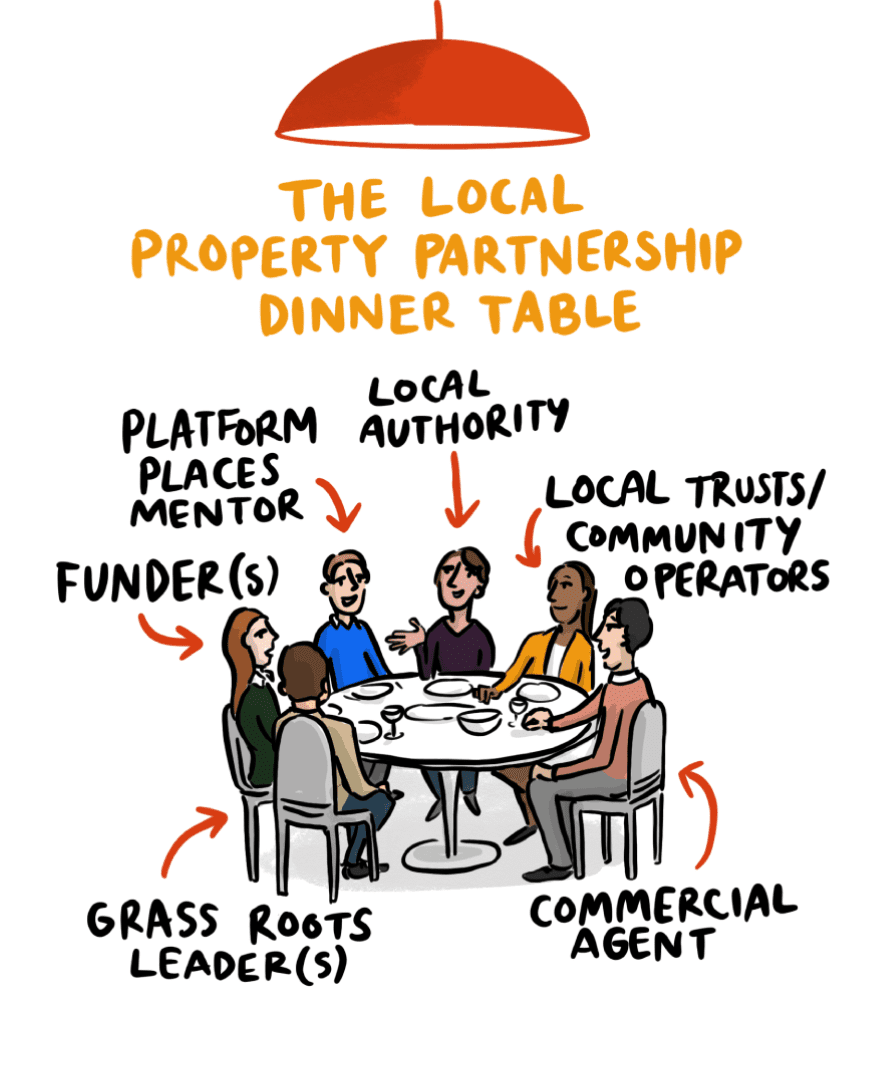
Today, the National Lottery Community Fund is supporting Platform Places and partners with £2.5 million to shift power to community entrepreneurs in five places, so they can convene these dinner tables and grow what we call ‘Local Property Partnerships’ – a process that transforms neighbourhoods by bringing multiple buildings into community use and ownership.
The five partnerships are showing early signs of success. In the first six months, more than a hundred cross-sector partnerships are developing, more than twenty assets shortlisted, and over fifty local stakeholders convened around dinner tables. A 10-year rent-free social value lease has been secured in Wandsworth Town – which will become a community cafe and youth training hub. Other partnerships are securing affordable spaces for community food hubs, wellbeing spaces, centres for social justice and cultural venues. Kisha Bradley, our local community partner in Darnall Ward, told me this work and funding has been transformational: “we’re now able to think and act long-term in our neighbourhood.”
An ambitious vision for the future
Through the work of Platform Places, the Mycelial Network of community asset developers, as well as the many examples of community-led innovation already underway, we want to transform the system of land and property ownership to enable social justice and climate-safe neighbourhoods. So, we hold three provocations close to heart:
First: What if, by 2035, one in three high street buildings were in community hands – owned or stewarded by local people?
Second: What if every neighbourhood had its own local property partnership — a cross-sector group transforming neighbourhoods, with community leaders in the driving seat, not just at the table?
Third: What if philanthropy and government came together to unlock billions of pounds – and powers – for community-led neighbourhood transformation?
If we can achieve this, we’ll see cultures and spaces of care and mutual aid. Ecosystems of community businesses will flourish, meeting local needs, creating meaningful work and inspiring civic pride and generosity – like Future Yard, Trinity Centre, Wolves Lane and many more today. Our neighbourhoods will be climate resilient, with rewilded green and blue spaces, retrofitted neighbourhoods and centres of response to our changing world as envisioned in CIVIC SQUARE’s and Dark Matter Labs’ 3°C Neighbourhood work.
What it takes to get there
However, we are still grappling with a land and property system that is deeply at odds with the one communities need to achieve this vision. Across three high streets we’ve mapped with local partners, over 90% of buildings were privately owned and controlled. Less than 0.1% were in community ownership. Many councils can’t identify who owns key sites – and when they can, owners are rarely incentivised to engage.
But there are actions that power-holders can start taking today, to unblock community-led development and create the future we want to see.
Philanthropic funders
We know £84 billion is locked up in the endowments of the 300 largest charitable foundations in the UK. This urgently needs to shift and flow out into communities – to build local wealth and power to organise in the face of crises.
Right now, we’re hearing countless stories of personal sacrifice from community asset leaders – maxing out personal credit cards to start community bakeries, remortgaging their homes to secure the first freehold on a civic building, overworking and burning out due to lack of core funds.
We hear stories of energy wasted to constant fundraising – applying for one small grant after another to assemble the financing necessary to do this work. Dr Jess Steele OBE, CEO and Commoner-at-Large at Hastings Commons, famously raised over 100 separate grants and loans to bring 9,000 square metres of a deprived Hastings neighbourhood into community ownership and stewardship.
What if, instead, funders collaborated with each other to create pooled, dedicated, long-term revenue funding for neighbourhood transformation? What if the ambition started to line up with the level of need and opportunity – rapidly shifting hundreds of millions of pounds? What if this unlocked billions in capital grants and long-term patient finance for asset acquisition and retrofit?
What if the flow of funds was co-governed and led with community leaders, rather than traditional gatekeeping?
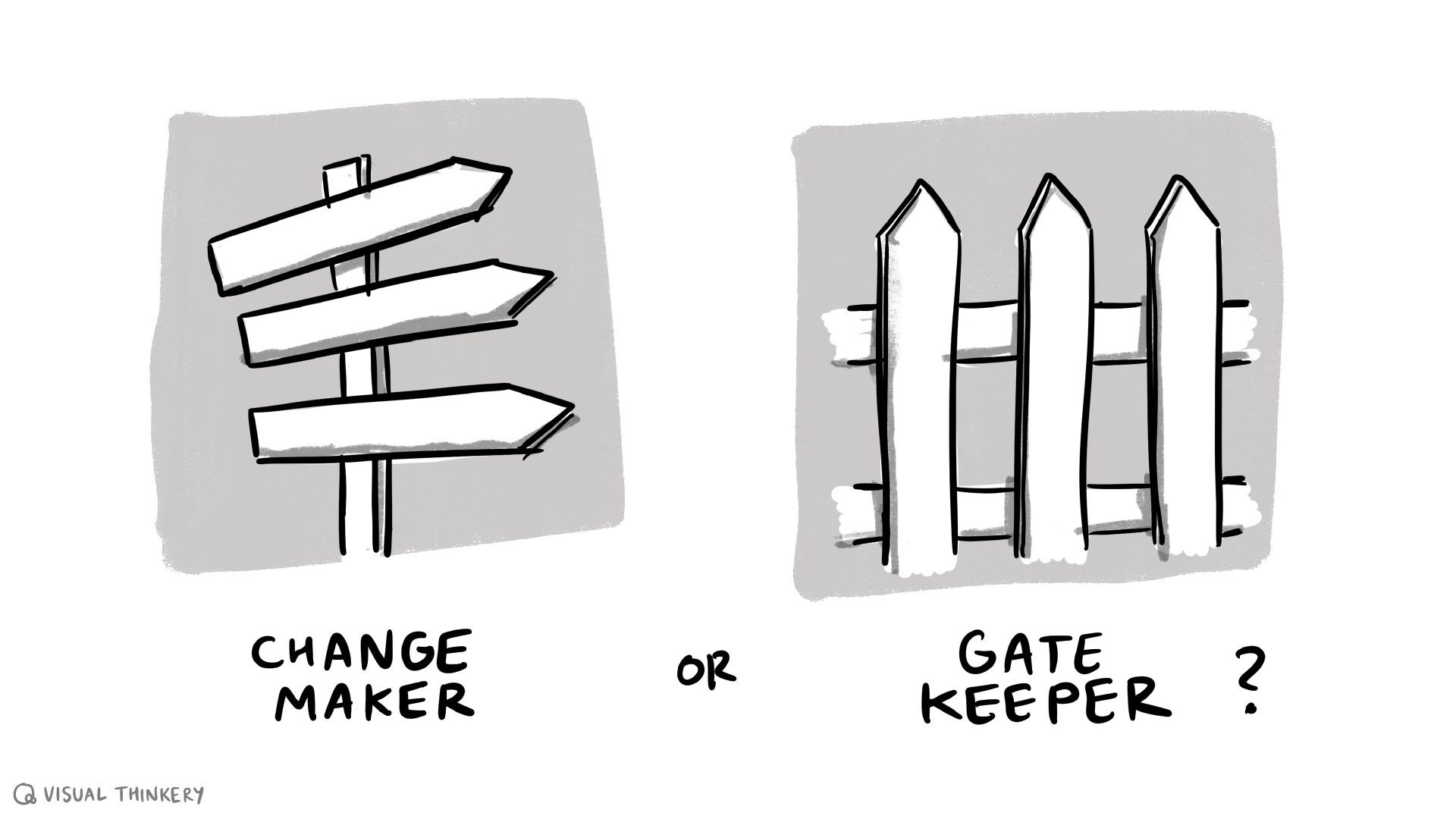
Government – local authorities and Westminster
Some local authorities don’t have the capacity or mindset to treat community organisations as strategic partners and allies. But where they have, results have been transformational. Take the example of Wirral Borough Council where long-term trust and partnership-building paid off in a successful Town Deal bid, which resourced community businesses to purchase and transform their buildings with and for creative communities around Birkenhead.
Alongside resources, communities should be able to exercise rights to share power in their neighbourhoods and pursue community ownership. As well as welcoming the progress towards a Community Right to Buy, the We’re Right Here campaign is calling on local authorities and Westminster to formalise the rights and powers of community organisations and businesses through community covenants. These covenants would formalise how councils and communities work together, enabling local groups to play an active and formal role in making the decisions that impact their lives.
Asset owners and developers
From Legal & General in Poole to Rockpoint Leisure in New Brighton, there’s a growing group of progressive private asset owners showing that with values-led multi-stakeholder partnerships, everyone stands to benefit.
One of the most powerful things that asset owners can do is offer long leaseholds or freeholds at below-market rates to community organisations – as ARC LRE Ltd are doing in Wandsworth Town. This moves beyond ‘meanwhile’ space – and creates vibrancy, footfall, local wealth, and social and environmental value for the long-term.
In summary, the most powerful thing these different stakeholders can do is to come to the literal and metaphorical dinner table when invited by community organisations – to build trust, to shape a shared vision, to co-design, to co-finance, to co-build and to steward places for the long-term. Ultimately, the only legitimate placemaking is driven by the people that live there.
The future of our high streets is no longer a technical question — it’s a relational one and a question of will.
Bex Trevalyan co-founded Platform Places after eight years spent working with communities to develop socially-just and climate-safe urban neighbourhoods – including growing her own community-led enterprise Library of Things to 21 London high street hubs.
